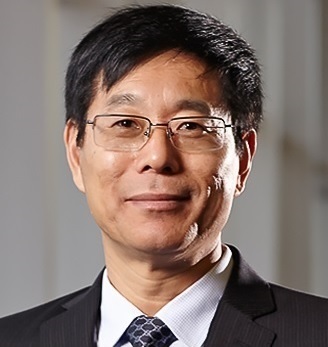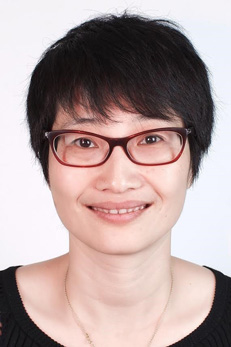Keynote Speakers
"Distributed Coordinated Control and Filtering of Networked Systems Subject to Network-Induced Constraints"
 Distinguished Professor Qing-Long Han
Pro Vice-Chancellor (Research Quality)
Distinguished Professor Qing-Long Han
Pro Vice-Chancellor (Research Quality)Swinburne University of Technology |
AbstractRecent advances in networking technologies, especially wireless networks, generate a new paradigm of control and filtering for industrial systems via networks. Traditionally, such systems are controlled and estimated by independent networks, which are designed with enough bandwidth and resources. In network environments, shared wired and wireless networks are utilized to connect industrial systems and controllers/filters. In this new framework, bandwidth and resource constraints should be taken into account in controller/filter design, and real-time becomes increasingly important to control and filtering. This keynote talk will provide a timely discussion on technical trends and challenges of distributed coordinated control and filtering for networked systems. |
Speaker biography
Professor Qing-Long Han is a leading researcher at the international level in the field of Control Theory and Control Engineering. He is one of The World’s Most Influential Scientific Minds: 2014-2016. He is a highly cited researcher in Engineering by Thomson Reuters on the lists of highly cited researchers 2014-2016. He is The Most Cited Researcher in both Electrical & Electronic Engineering and Mechanical Engineering on the list of The Most Cited Researchers: Developed for ShanghaiRanking’s Global Ranking of Academic Subjects 2016 by Elsevier. In May 2016, he was appointed Distinguished Professor at Swinburne University of Technology, Australia. In March 2014, Central Queensland University, Australia, awarded him the Title of Laureate Professor for his international research achievements and leadership, establishment of the Centre for Intelligent and Networked Systems, impressive portfolio of publications in world class journals, and research grant successes. In March 2010, he was appointed a prestigious Chair by China’s Ministry of Education, “Chang Jiang (Yangtze River) Scholar Chair Professor” in recognition of his outstanding contributions to Control Theory and Control Engineering.
Professor Han’s managerial experience includes as Pro Vice-Chancellor (Research Quality) at Swinburne University of Technology, Australia, Deputy Dean (Research), Griffith Sciences at Griffith University, Australia, and Associate Dean (Research and Innovation) of Higher Education Division/Faculty and Founding Director of Centre for Intelligent and Networked Systems at Central Queensland University, Australia, during which he has managed to foster many research activities at Swinburne University of Technology, Griffith Sciences, Griffith University, Australia, and Central Queensland University, Australia.
Professor Han has secured over twenty-seven competitive grants including recently awarded Key Project of The Natural Science Foundation of China (NSFC) in 2016 and ARC Discovery Project in 2015. He received the Dean’s Award for Excellence in Research at Central Queensland University, in 2003 and 2005, respectively. He received The IET Control Theory and Applications Premium Award in 2016.
Professor Han has been conducting research in the field of Control Theory and Control Engineering. He has published over three hundred (300) fully-refereed papers in prestigious journals and leading conferences. In particular, since 2001, he has published one hundred and sixty-three (163) fully-refereed high quality journal articles, of which twenty-one (21) articles are published in Automatica and fifty-seven (57) articles are published in the most prestigious IEEE Transactions.
Professor Han’s research work has been cited 12400 times with h-index of 54, i10-index of 142 according to Google Scholar, 9428 times with h-index of 48 according to SCOPUS, and 7654 times with h-index of 45 according to ISI Web of Science.
Professor Han has served as an expert of international standing to evaluate applications for Australian Research Council (ARC) Australian Laureate Fellowships, ARC Future Fellowships, ARC Discovery Projects, ARC Linkage Projects, ARC Discovery Early Career Researcher Award (DECRA), and Chang Jiang (Yangtze River) Scholar Distinguished Professorships/Chair Professorships, Ministry of Education, China.
Professor Han has served as Chair of IEEE Industrial Electronics Society (IES) Technical Committee on Network-based Control Systems and Applications, Member of IEEE IES Technical Committee on SmartGrids, Member of IFAC Technical Committee on Networked Systems, Member of IFAC Technical Committee on Linear Control Systems, and Member of IFAC Technical Committee on Power and Energy Systems.
Professor Han has served as an Associate Editor for IEEE Transactions on Industrial Electronics; IEEE Transactions on Industrial Informatics; IEEE Transactions on Cybernetics; Information Sciences, Kybernetika; International Journal of Automation and Computing; Dynamics of Continuous, Discrete and Impulsive Systems, Series B: Applications and Algorithms; and Guest Editor (Managing Guest Editor), Special Issue on New Trends in Control and Filtering of Networked Systems, IEEE Transactions on Industrial Informatics; Guest Editor (Managing Guest Editor), Special Issue on Recent Developments on Distributed Networked Control Systems, Information Sciences; and Guest Editor and Coordinator, Special Issue on Time-delay Systems, Asian Journal of Control.
Professor Han has served as General Chair for The 27th IEEE International Symposium on Industrial Electronics (IEEE-ISIE 2018), 13-15 June 2018, Cairns, Australia; Chair, National Organising Committee, and Chair, International Program Committee, for The 7th International Conference on Complex Systems, 6-10 December 2004, Cairns, Australia; and Chair, International Program Committee, The 2014 International Conference on Life System Modeling and Simulation (LSMS2014) and The 2014 International Conference on Intelligent Computing for Sustainable Energy and Environment (ICSEE2014), 20-23 September 2014, Shanghai, P.R. China; Organiser and Chair, Workshop on Communication & Control for Distributed Networked Systems, 20-23 September 2014, Shanghai, P.R. China. He has served as Technical Chairs and IPC Members for over 30 international conferences including The 42ndAnnual Conference of the IEEE Industrial Electronics Society and so on.
"Iterative Learning Control and its Applications on Computational Modelling of Human Motor Systems"
 Associate Professor Ying Tan
Associate Professor Ying Tan University of Melbourne |
AbstractThe key idea in Iterative Learning Control (ILC) is captured by the saying “practice makes perfect". Whenever a task is of a repetitive nature the opportunity exists to improve the task execution in the next iteration based on the observation of the past attempts. ILC has been widely used in many industrial processes, such as wafer manufacturing processes, batch reactor processes, IC welding processes, and various assembly lines or production lines and so on. From a qualitative point of view, ILC paradigm describes our own experience of learning motor tasks, such as walking, bicycle riding and writing. Hence the philosophy behind ILC is quite similar to one of the fundamental principles of human motor learning in the Human Motor System (HMS). The HMS is quite complicated and hard to model. Thus computational modelling of HMS has been the subject of many research studies in recent years. Recent studies of ILC in rehabilitation robotics show that ILC plays an important role in understanding how HMS works. As the ability to learn is one of the major characteristics of HMS, it is not surprising that the similarities between HMS models and the ILC algorithms are striking. In this talk, a computational HMS model is presented to capture the learning capacity of a human subject in adapting his or her movements in the face of novel dynamics or new environments. The obtained HMS computational model uses various ILC algorithms to represent the ability of human learning through repetitive processes. The control law performs the adaptation of human beings with respect to environment changes. The resulting computational model is experimentally validated. This new technique yields the capability of subject specific modelling of the motor function, as is required for prediction of individual behaviour in post-stroke rehabilitation. |
Speaker biography
Ying Tan obtained her PhD degree in Electrical Engineering from National University of Singapore in 2002. After that, she joined the Department of Chemical Engineering, McMaster University as a postdoctoral fellow. Since 2004, she has been with Department of Electrical and Electronic Engineering, the University of Melbourne. She is currently an Associate Professor and Reader. Ying Tan was awarded an Australian Postdoctoral Fellow (2006-2008) and a Future Fellow (2009-2013) by the Australian Research Council. She has published a large number of journal and conference papers and books. She currently is an Associate Editor for the journals “IEEE Transactions on Automatic Control”, “Systems and Control Letters” and “Asian Journal of Control”. Her current research interests are Iterative Learning Control, Extremum Seeking Control, Nonlinear Systems and applications in rehabilitation robotic systems and engine operation optimizations.
"The learning conflict in stochastic control - real life (and death) examples"
 Professor Robert Bitmead
Professor Robert BitmeadUniversity of California |
AbstractOutside of linear systems, the control input signal to a stochastic system serves two distinct and often competing purposes: enhancing the observability of the system state by excitation or probing, and regulating the state to achieve the control objective. The difficulty is that the latter regulation performance depends on the former state observability, but the probing diminishes regulation. This is referred to as duality or, in robotics, the exploration-exploitation tradeoff. For optimal stochastic control problems, the need to include the effects of the current control on the quality of state observability in the future leads to computational intractability. So more compliant but suboptimal methods are needed. In this presentation, the duality problem will be exemplified by a set of common examples - in internet congestion control, parameter estimation, and cellular wireless - each of which is accompanied by a working practical solution with no measure of the level of suboptimality. An intriguing (because it derives from a problem in radar) study in disease management will then be presented. This case is amenable to recasting as a partially observed Markov decision problem on a finite state space, which renders the optimal stochastic control computable and exhibits duality in its solution. The purpose of the presentation, which will strive to be accessible rather than mathy, is to highlight to performance costs of learning in stochastic control. |
Speaker biography
Bob Bitmead occupies the Cymer Corporation Endowed Chair in Mechanical & Aerospace Engineering at the University of California, San Diego. He holds degrees in Applied Mathematics and Electrical Engineering from Sydney University and Newcastle University, both in Australia. He is a control theorist with a long experience in control applications in many industrial sectors: sugar, steel, mining, telecommunications, aerospace, transportation, energy, and photolithography. His theoretical work is strongly informed and guided by these applications. He was the recipient of the 2014 ASME Rufus Oldenburger Medal, a lifetime achievement award in control, and of the 2015 IEEE Controls Systems Transition to Practice Award. Bob was Vice-President for Financial Activities of the IEEE Control Systems Society 2015-6. He is Editor-in-Chief of the IFAC Journal of Systems & Control. Bob brews his own beer and is an accredited and active Australian Rules Football umpire.